What You Will Learn in This Article
- Meaning of adaptogen
- Historical uses
- The spectrum of adaptogens
- Some adaptogens to explore
- Find what works for you
- Keep cortisol in mind
- How to start adding adaptogens
Adaptogens are herbs and mushrooms that enhance our ability to cope with stress. This includes physiological stress, environmental stress, emotional/psychological stress, and even spiritual stress. They work by supporting and balancing our natural stress responses.
You may have used some of these products without even knowing they were adaptogens. For instance, maca, ginseng, licorice root, and valerian are all adaptogens. Ginseng is popular as an energy booster and valerian is a “go-to” for addressing sleep issues.
Unfortunately, we have a tendency to use adaptogenic herbs and supplements as we would use pharmaceutical drugs. In other words, we rely on these herbs to address symptoms and/or return us to good health while ignoring other key aspects such as chronic stress, trauma, poor sleep habits, poor diet, overworking, overexercising… et cetera.
We can’t expect the adaptogens to pull off a miracle while not fixing other aspects of our lives (possibly even root causes) that are really draining our energy levels.
That’s where relying on adaptogens can be harmful. Because they are so good at alleviating fatigue, improving mental clarity, and increasing stamina and endurance, using them can mask symptoms of underlying health issues. That can lead us to assume our health is good and that we don’t have to make any changes to our current way of living.
Adaptogens should not be used to offset poor health and lifestyle choices. They work best when combined with sound health practices, such as an anti-inflammatory diet, plenty of sleep, moderate/right exercise, self-love, resolved trauma, time for self-care, and healthy, nourishing relationships.
What Does “Adaptogen” Mean?
Adaptogens get their name from their ability to help the body adapt to stress. Again, this includes physiological stress, environmental stress, and even emotional or psychological stress. The word “adaptogen” was first used in the former USSR to describe a substance that enhances the body’s resistance to stress. Dr. Nikolai Lazarev defined an “adaptogen” in 1947 as “an agent that allows the body to counter adverse physical, chemical, or biological stressors by raising nonspecific resistance towards such stress, thus allowing the organism to adapt to the stressful circumstances.”
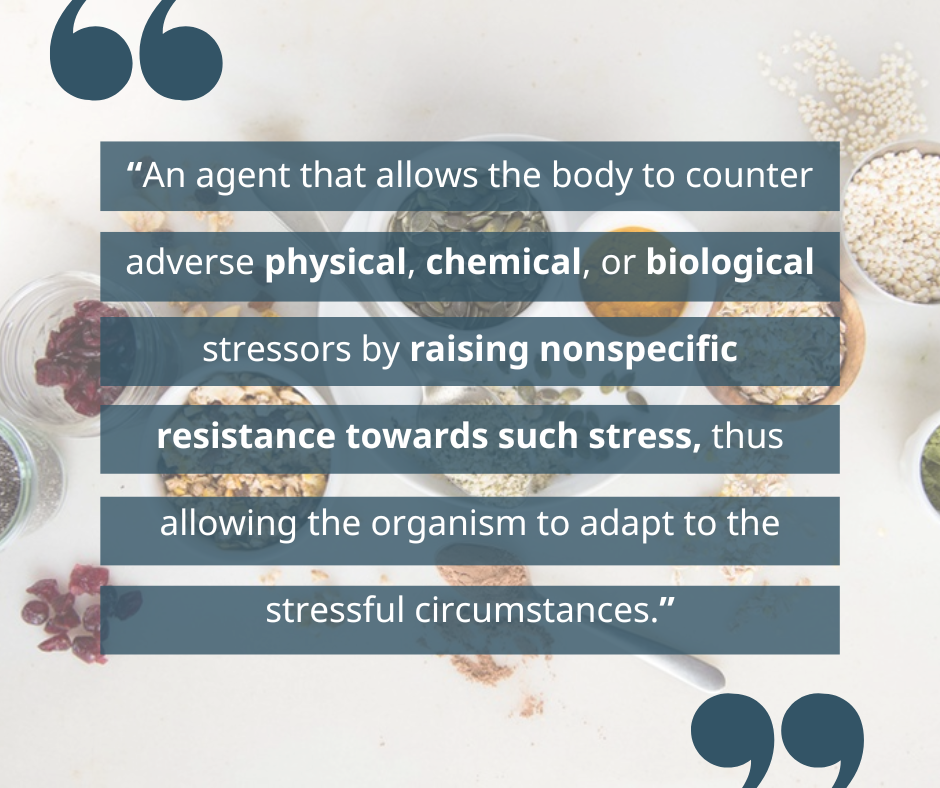
Adaptogens were used to improve health long before they had an official definition.
Historical Uses of Adaptogens
Adaptogens were historically used as “longevity” or “vitality” tonics.
They are considered amphoteric substances. In old herbal language, this means that they balance or normalize function. Some specific historic uses for adaptogenic herbs include the following: (1)
- Panax ginseng was used to treat fatigue and weakness, strengthen the immune system, as a health tonic, and as a nootropic—enhancing brain function.
- Rhodiola Rosea was traditionally used to increase physical endurance, lessen fatigue, alleviate depression, improve the immune system, and treat nervous system disorders.
- Schisandra Chinensis was traditionally used as a remedy for coughs and asthma, reducing hunger and thirst, treating exhaustion, and improving night vision.
Soviets particularly used adaptogens to enhance performance in elite athletes, astronauts, soldiers, and workers. Their early research especially focused on Siberian Ginseng (Eleutherococcus senticosus).
Spectrum of Adaptogens
Adaptogens can be put on a sort of spectrum, from highly stimulating and revitalizing to sedating. Rhodiola and ginseng are well-known stimulating herbs, while valerian and hops are sedating. They are popular herbs for promoting relaxation and sleep.
Take a look at where these herbs fall in the table below:
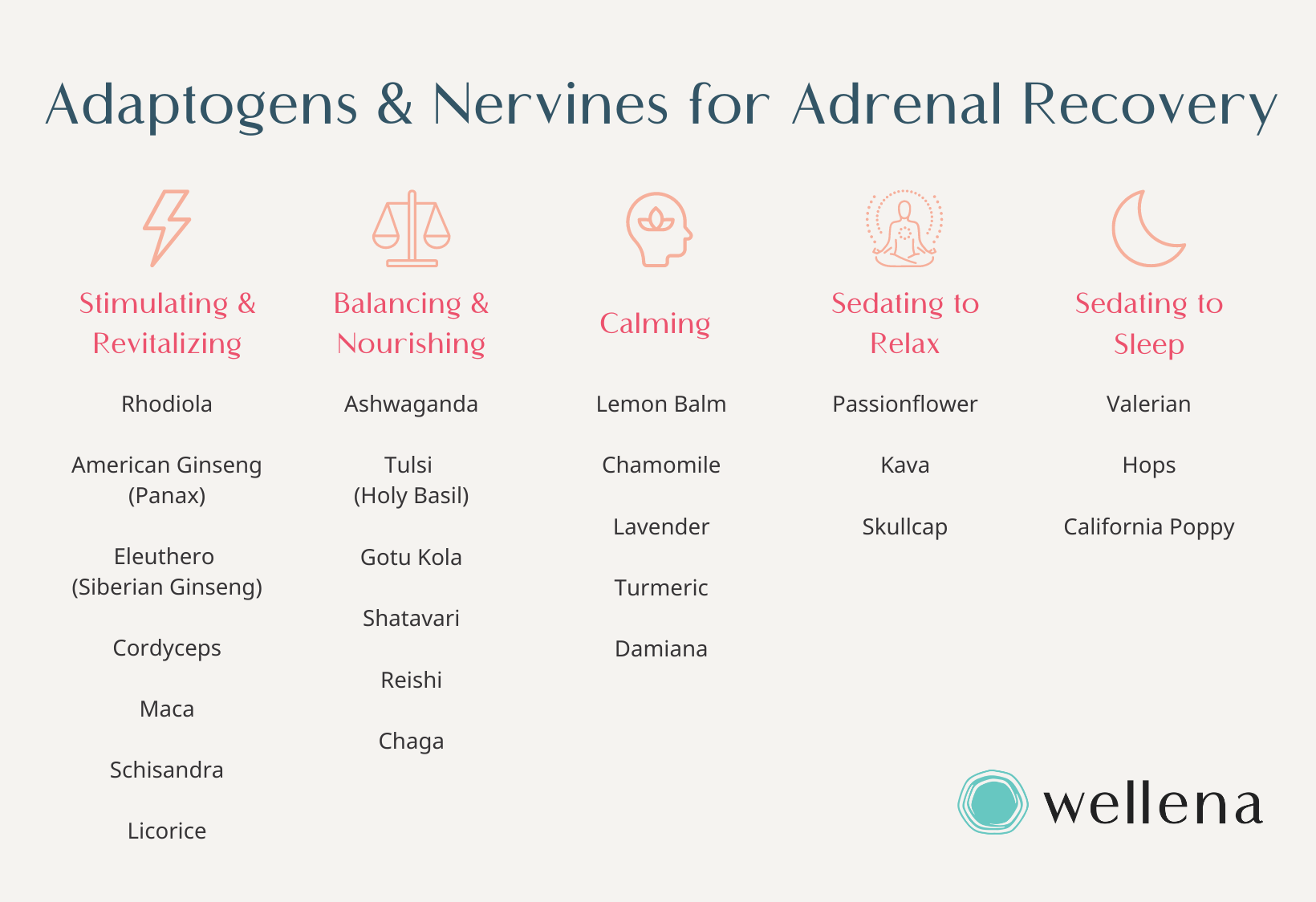
You can see that some simply help create calming and balance.
Explore These Adaptogens
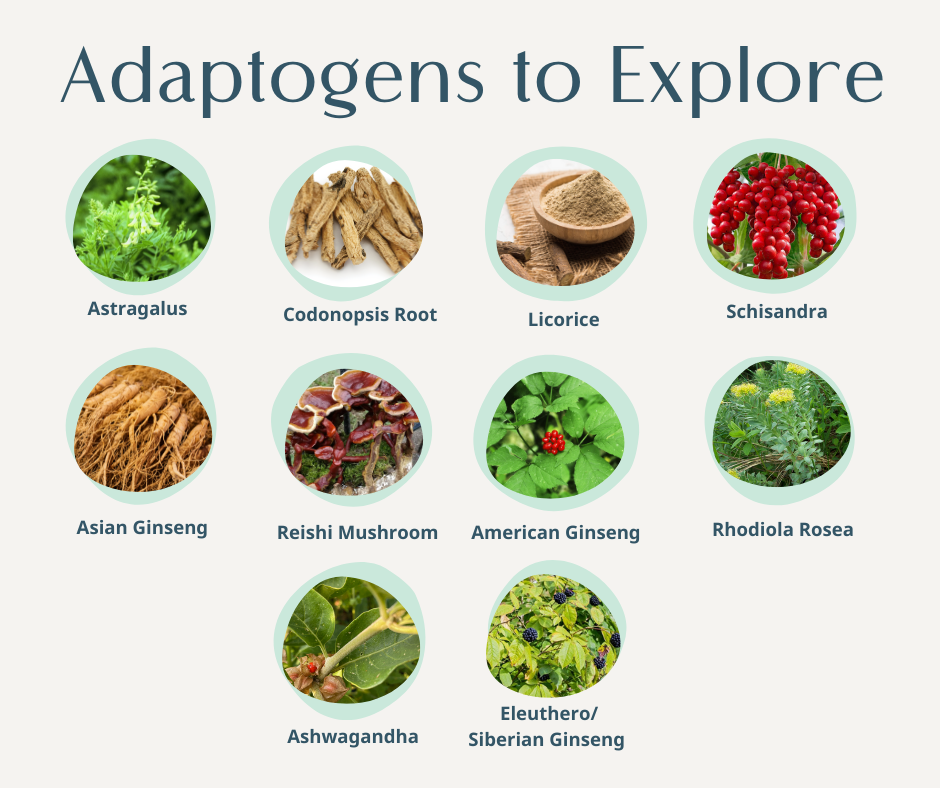
Below are some of the most popular and commonly found adaptogenic herbs and mushrooms that you can test out and see how they work for you. Many of these adaptogens have been the subject of research and have even been used as a part of case studies or clinical trials.
Astragalus
Astragalus (Astragalus membranaceus), known as “huáng qí” in Mandarin, is a popular herb in Traditional Chinese Medicine (TCM). It’s used to promote healing in the body and reduce fatigue.
According to research, astragalus is anti-inflammatory, an antioxidant, and supportive of the liver, heart, and immune system. (2)
It’s the main herb used for strokes in China and Taiwan. In a clinical trial of 64 patients who’d had strokes, astragalus was evaluated to see how it helped post-stroke fatigue. Astragalus was helpful for fatigue, social and cognitive functioning, and quality of life compared to the control group. (3)
Astragalus-infused bone broth is a great way to get this herb into your diet. You can easily make it in the slow cooker. Here’s a recipe for Astragalus Immune-Boosting Bone Broth.
I buy my organic astragalus root from Starwest Botanicals. You can also get it as a tincture, I like the one from HerbPharm.
Caution: Don’t use astragalus if you’re already ill or feel like you’re coming down with something, as this potent herb could make you feel worse.
Codonopsis Root (Dan Shen)
Codonopsis (Codonopsis pilosula), or “Dang Shen” as it’s known in Traditional Chinese Medicine (TCM) is used to help bring balance to the immune system. It’s similar to Panax (“Korean”) ginseng but less stimulating.
According to research, extracts from this herb are not only balancing to the immune system, but also helpful for creating new blood cells, improving the cardiovascular system, protecting the nervous system, regulating gut health, balancing hormones, and even slowing down the aging process. (4)
It’s an all-around great adaptogen for promoting balance throughout the body.
Eleuthero/Siberian Ginseng
Eleuthero, or “Siberian Ginseng” (Eleutherococcus senticosusis). This herb is a relative to the true ginsengs (Asian and American), but lacks the ginsenosides that true ginsengs have. However, it works similarly to ginseng plants.
This herb can effectively help your body adapt to stress. A study on stressed mice found that eleuthero could alleviate fatigue, improve the immune system under stress, and balance elevated cortisol levels. (5)
Licorice
Licorice root is an herb that’s long been used in TCM to improve energy levels and combat fatigue. It was even used by ancient Egyptians and Assyrians in an earlier form. Licorice keeps cortisol in the system from breaking down, keeping it circulating longer to keep energy balanced.
Because licorice increases parathyroid hormone, it can help with bone metabolism in creating strong, healthy bones –possibly because it has some estrogen-like activity due to its isoflavans. (6)
Licorice root may also be helpful for PCOS and hirsutism. Because it can block certain enzymes that affect testosterone levels, licorice root can reduce blood levels of testosterone in healthy women, and for that reason, it could be helpful for conditions related to elevated testosterone like PCOS and hirsutism (abnormal hair growth on the face in women). (6)
Try some Licorice Root Tea after meals, but not too close to bedtime as it can be stimulating.
Reishi Mushroom
Reishi mushroom (Ganoderma Lucidum). Reishi is known as Ling Zhi in Traditional Chinese Medicine (TCM). Some ways it helps the body become more balanced include:
- Supporting hormonal and immune balance (7)
- Supporting balanced female hormones (8)
- Supporting sleep (9)
- Supporting balanced mood (10)
- Supporting the body’s natural anti-inflammatory response (11)
Pique Tea makes a great Reishi Calm Elixir, which is a blend of reishi powder, reishi extract, date extract, goji powder, and Luo Han Gao/monk fruit extract.
You can incorporate reishi into healthy meals: Here’s a great Winter Tonic Mushroom Soup or, more substantial meal, try this Reishi Mushroom Soup with Carrots and Kale.
Asian Ginseng
Asian Ginseng (Panax ginseng) is also called Korean ginseng. This adaptogenic root is stimulating to the nervous system (boosting energy levels) and helps the HPA (Hypothalamic-pituitary-adrenal) axis adapt to stress.
It’s been shown to lower stress and inflammation, slow aging, enhance the immune system, support the liver, and improve brain function. (12)
In a clinical trial of 90 patients with chronic fatigue syndrome, 2 grams of ginseng was given each day over 4 weeks helped reduce fatigue and improve antioxidant levels. Raising antioxidants seemed to be a part of ginseng’s ability to raise energy levels. (13)
Asian ginseng has also been shown to be balancing for various hormones, including estrogen and cortisol. (14)
Asian Ginseng (Panax ginseng) is one of the rock star herbs behind the magic of the very popular Adrenal TLC — an adaptogenic supplement blend.
American Ginseng
American Ginseng (Panax quinquefolius) is very similar to Asian ginseng. It’s stimulating to the nervous system and balancing to the HPA/stress-response system.
American ginseng is also balancing to your blood sugar levels. In a study of patients with type 2 diabetes, 1 gram of American ginseng (or a placebo) was given with meals (3 grams per day) over 8 weeks. American ginseng was shown to significantly reduce hemoglobin A1C levels compared to the placebo. It also reduced fasting blood sugar by 10%. (15)
It also worked in healthy people. Doses of 1 to 3 grams given 40 minutes before meals helped lower post-meal blood sugar levels. Although it was a small study (12 people), it confirmed the results of the study in diabetics above. (16)
Since high blood sugar levels are a stress on the body, taking American ginseng before or with meals could be very helpful in balancing stress levels.
Rhodiola Rosea
Rhodiola Rosea has been shown in studies to have adaptogenic, anti-depressant, and anti-anxiety-like properties, which can help the body adapt to stress. (17)
Enjoy Rhodiola as a part of an adaptogenic latte. The recipe includes a dropperful of Rhodiola along with adaptogenic tulsi and some warming spices.
This herb can be too energizing for some people, particularly those that are really in a state of exhaustion. For that reason, it’s a good idea to start on a lower dose and work your way up. Take it in the morning and see how you do.
Rhodiola Rosea is one of the rock star herbs behind the magic of the very popular Adrenal TLC — an adaptogenic supplement blend.
Schisandra
Schisandra (Schisandra Chinensis) is one of my favorite herbs, I’m energetically very drawn to it which probably means my body is asking for it and needs its support. I typically keep it on my kitchen counter and have a dropper or two every day. This berry has a complex taste; it’s a unique combination of sour, salty, warm pungency, and slightly bitter flavors.
Research has shown this superfood berry goes beyond its adaptogenic capabilities and is powerful for liver support. It protects the liver from toxins, increases bile flow, and promotes liver detoxification. It also lowers inflammation, (18, 19)
You can buy the whole berries from Mountain Rose Herbs and add them to bone broths. Another option is to add them to an Immune Boosting Vinegar or oxymel recipe.
You can also get Schisandra as a tincture (which is great for consistency quality) – I like the one from Nature’s Answers because it uses glycerine, making it sweet and delicious.
Ashwagandha
Ashwagandha (Withania somnifera) is an Ayurvedic herb that’s also known as “Indian Ginseng.” It’s a rejuvenating herb that helps balance the thyroid, improve sleep, and increase energy. Research has confirmed that ashwagandha is good for improving energy and increasing stamina.
Studies show it improves stress tolerance and supports adrenal function. (20) It also supports the immune system and improves and balances the mood (addresses both depression and anxiety). (21, 22)
Ashwagandha is mostly calm and helpful for sleep. However, because it supports thyroid function, ashwagandha can be energizing for some people. (23)
A good way to enjoy the benefits of ashwagandha is by whipping up an Ashwagandha latte, as described here.
Find What Works For You
There are two different approaches to giving adaptogens a try.
You can either take one adaptogen and really develop a relationship with that herb or supplement, testing it to see how your body responds to it. Another approach you can take is to find a combination product that includes a few different adaptogens blended together and see if that product is helpful.
Find what works for you. My favorites are Schisandra and Rhodiola Rosea. Ashwagandha doesn’t do much for me.
Keep Cortisol in Mind in Overall Hormone Health
The stress hormone, cortisol, plays a major role in overall hormonal health. For a few examples, it:
- Lowers progesterone
- Causes inflammation
- Causes sleeplessness
- Suppresses the immune system
The nervous system, immune system, and endocrine system (hormones) are intricately connected. What affects one system affects the others. For that reason, it’s really important to address stress and cortisol levels if you are wanting to balance your hormones. That’s where adding adaptogens can help.
How to Start Adding Adaptogens
If you’re feeling a bit run down and looking for a great adaptogenic product to start with, try Wellena’s Adrenal TLC. This supplement combination includes two favorite herbal adaptogens:
- Rhodiola Rosea
- American ginseng
These adaptogens have been used in traditional Chinese Medicine and Ayurvedic medicine for centuries to help the body cope with stress.
Along with this supplement, don’t forget to practice good health and lifestyle habits, including:
- A nourishing, whole foods diet (addressing individual food sensitivities)
- Basic supplements, like B complex, vitamin D3, magnesium, and omega-3 fatty acids.
- Adequate sleep and rest
- Gentle physical activity
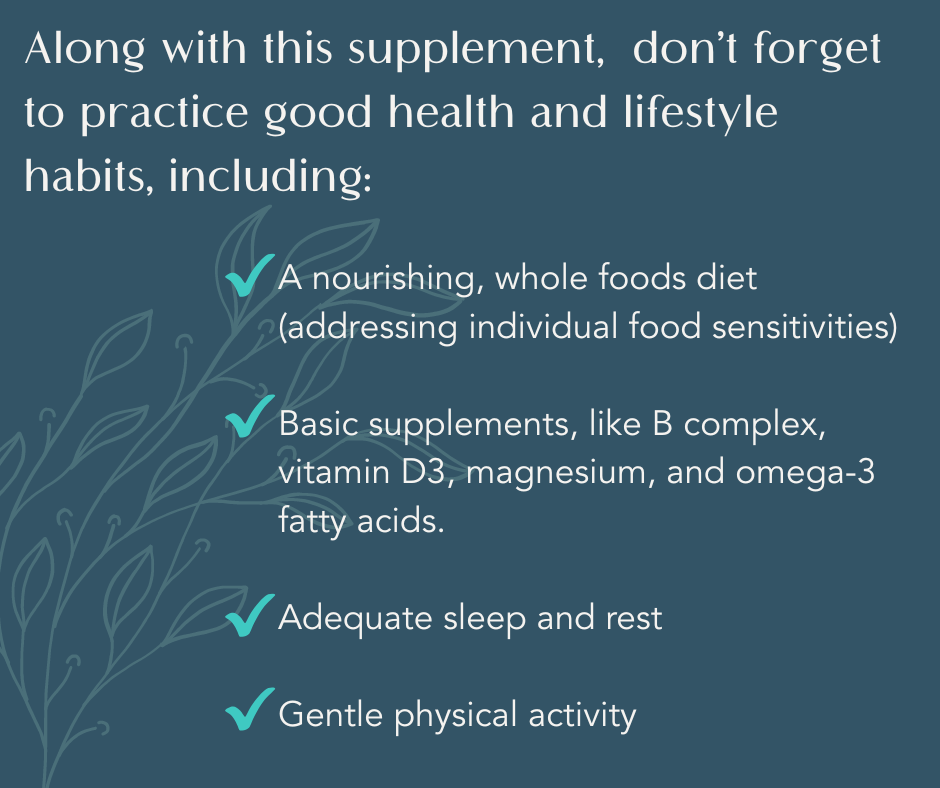
Getting back into balance with adaptogens needs to be done with a holistic approach. Make sure adaptogens aren’t used simply as a substitute for pharmaceutical medications or a caffeine habit but are used within the context of a balanced, health-promoting daily routine.
Conclusion
To sum it all up, I’ll say this: there is a time and place for adaptogens. They are not to be used as a “golden bullet” or panacea, yet they can be very effective when combined with a healthy diet and lifestyle. These are powerful botanicals that can support your goals of achieving radiant health and hormonal balance.
Resources
- Todorova, Velislava et al. “Plant Adaptogens-History and Future Perspectives.” Nutrients. August 20, 2021.
- Li, Xiaoxia et al. “A review of recent research progress on the astragalus genus.” Molecules (Basel, Switzerland). November 17, 2014.
- Liu, Chung-Hsiang et al. “Effects of the traditional Chinese herb Astragalus membranaceus in patients with poststroke fatigue: A double-blind, randomized, controlled preliminary study.” Journal of ethnopharmacology. 2016.
- Gao, Shi-Man et al. “Traditional uses, phytochemistry, pharmacology and toxicology of Codonopsis: A review.” Journal of ethnopharmacology. 2018.
- Kimura, Yoshiyuki, and Maho Sumiyoshi. “Effects of various Eleutherococcus senticosus cortex on swimming time, natural killer activity and corticosterone level in forced swimming stressed mice.” Journal of ethnopharmacology. 2004.
- Omar, Hesham R et al. “Licorice abuse: time to send a warning message.” Therapeutic advances in endocrinology and metabolism. 2012.
- Lu, Yao-zeng et al. “Effectiveness of Ganoderma lucidum preparation in treating simian acquired immune deficiency syndrome.” Zhongguo yi xue ke xue yuan xue bao. Acta Academiae Medicinae Sinicae. 2011.
- Shimizu, K. et al. Estrogen-like activity of ethanol extract of Ganoderma lucidum. The Japan Wood Research Society. 2008.
- Cui, Xiang-Yu et al. “Extract of Ganoderma lucidum prolongs sleep time in rats.” Journal of ethnopharmacology. 2012.
- Zhao, Hong et al. “Spore Powder of Ganoderma lucidum Improves Cancer-Related Fatigue in Breast Cancer Patients Undergoing Endocrine Therapy: A Pilot Clinical Trial.” Evidence-based complementary and alternative medicine: eCAM. 2012.
- Barbieri, Antonio et al. “Anticancer and Anti-Inflammatory Properties of Ganoderma lucidum Extract Effects on Melanoma and Triple-Negative Breast Cancer Treatment.” Nutrients. February 28, 2017.
- Chen, W., Balan, P., & Popovich, D. G. Analysis of Ginsenoside Content (Panax ginseng) from Different Regions. Molecules (Basel, Switzerland), 2019.
- Kim, Hyeong-Geug et al. “Antifatigue effects of Panax ginseng C.A. Meyer: a randomised, double-blind, placebo-controlled trial.” PloS on. April 17. 2013.
- Park, Joonwoo et al. “Ginseng on Nuclear Hormone Receptors.” The American journal of Chinese medicine. 2017.
- Vuksan, Vladimir et al. “Efficacy and safety of American ginseng (Panax quinquefolius L.) extract on glycemic control and cardiovascular risk factors in individuals with type 2 diabetes: a double-blind, randomized, cross-over clinical trial.” European journal of nutrition. 2019.
- Vuksan, V et al. “American ginseng (Panax quinquefolius L.) attenuates postprandial glycemia in a time-dependent but not dose-dependent manner in healthy individuals.” The American journal of clinical nutrition. 2001.
- Perfumi, Marina, and Laura Mattioli. “Adaptogenic and central nervous system effects of single doses of 3% rosavin and 1% salidroside Rhodiola rosea L. extract in mice.” Phytotherapy research: PTR. 2007.
- Szopa, Agnieszka et al. “Current knowledge of Schisandra chinensis (Turcz.) Baill. (Chinese magnolia vine) as a medicinal plant species: a review on the bioactive components, pharmacological properties, analytical and biotechnological studies.” Phytochemistry reviews: proceedings of the Phytochemical Society of Europe. 2017.
- Shicheng F., et al. Lignans from Schisandra sphenanthera protect against lithocholic acid-induced cholestasis by pregnane X receptor activation in mice. Journal of Ethnopharmacology. 2019.
- Archana, R, and A Namasivayam. “Antistressor effect of Withania somnifera.” Journal of ethnopharmacology. 1999.
- Chandran, Uma, and Bhushan Patwardhan. “Network ethnopharmacological evaluation of the immunomodulatory activity of Withania somnifera.” Journal of ethnopharmacology. 2017.
- Bhattacharya, S K et al. “Anxiolytic-antidepressant activity of Withania somnifera glycowithanolides: an experimental study.” Phytomedicine : international journal of phytotherapy and phytopharmacology. 2000.
Panda, S, and A Kar. “Withania somnifera and Bauhinia purpurea in the regulation of circulating thyroid hormone concentrations in female mice.” Journal of ethnopharmacology. 1999.
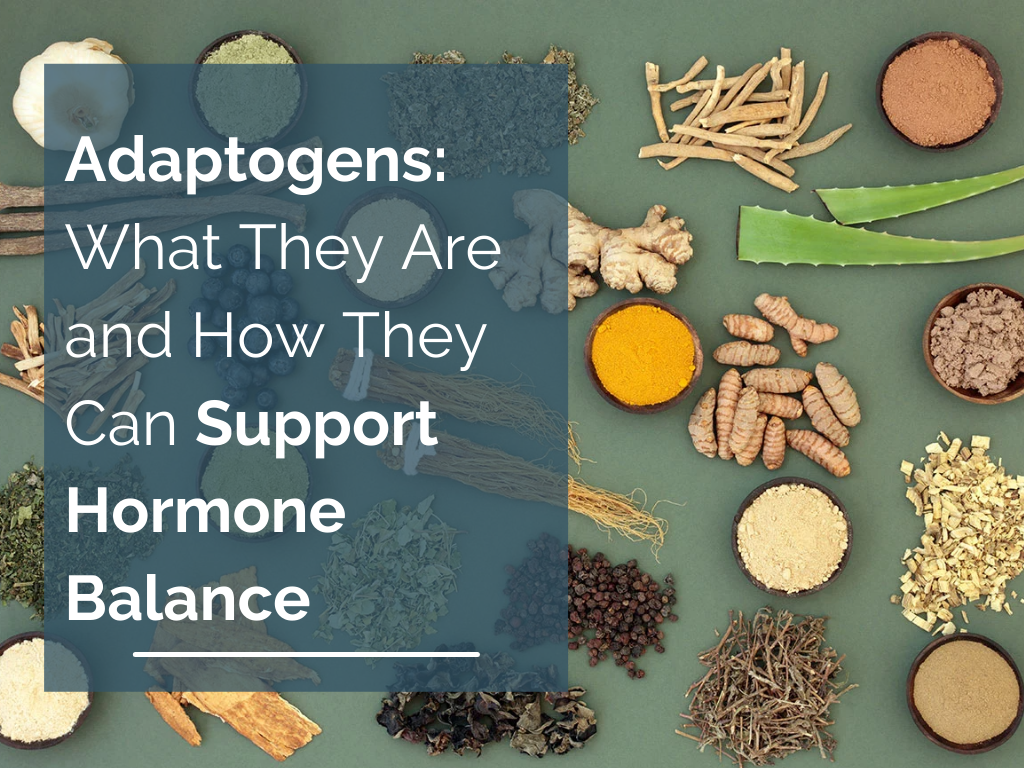
Under the Spectrum of Adaptogens heading, the table seems to be missing?
Hi Amanda, thank you for pointing this out to us. I reached out to my team for this to be reviewed. We appreciate you! ~HB Support
Rhodiola also helps with both types of stress.
GREAT INFORMATION!, Adaptogens all summed up.